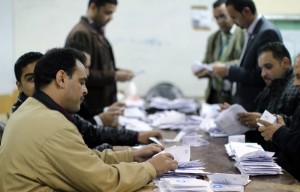
(AFPPhoto)
Shura Council members voted down the formation of electoral districts for Egyptians abroad in the upcoming elections for the House of Representatives in its Tuesday session.
The council is set to vote on the new House of Representatives elections bill and the political participation bill, which together form the legislation governing the electoral process for the upcoming lower house parliamentary elections.
Council members debated the House of Representatives election bill in plenary during the Tuesday session after the upper house’s Committee on Constitutional and Legislative Affairs voted to increase seats in the House of Representatives to 552 on Monday afternoon.
The committee approved the bill in its session and submitted it to the Shura Council ahead of scheduled debate and voting in plenary on Tuesday.
The new bill also introduced new districts for expatriates; Egyptians abroad would have been represented in the lower house of parliament with a total of six seats.
Under the new bill, four representatives would have been elected in one district through closed party list proportional representation while the remaining two seats would be filled in another district through individual two-round voting.
Voters abroad would have been allowed to mail their ballots. Candidates for the expatriate seats could be expatriates but candidates based in Egypt would also be allowed to run, committee rapporteur and Muslim Brotherhood member Sobhy Saleh said.
He added that the new expatriate voting system was in accordance with Article 56 of the constitution, which stipulates that the state must protect the interests of Egyptians abroad.
The government’s representative Omar Al-Sharif expressed concerns to Shura members that having special districts for Egyptians abroad could be unconstitutional.
The amendment was not suggested by the government or council members but by the Supreme Electoral Commission’s representative and as such could be unconstitutional, he said.
Saleh responded that although the amendment came from outside the council, two committee members sponsored it, which makes it constitutional.
Al-Sharif then argued that Egypt does not have governorates abroad and as such cannot have electoral districts outside of the country. SEC representative Hesham Mokhtar said the amendment was based on the demands of expatriate Egyptians.
Shura Council members eventually voted against the proposition, which was in Article 4 of the bill.
They voted to pass the first three articles which govern the electoral system and the distribution of seats among party lists and individual candidate as well as defining workers and farmers, since the constitution affords them 50% of seats in the upcoming parliament.
Committee members earlier voted to ban campaign slogans altogether after they received strong criticism for attempting to lift the ban on religious slogans.
They also changed earlier legislation forcing parties to place at least one female candidate in the top half of their lists. The changes mean that parties only have to run a female candidate without stipulating her placement.
Other changes include the increase of districts to 49 districts reserved for closed party list proportional representation voting, one district of which is reserved for expatriates, and 92 districts for individual two-round voting, one of which is also reserved for expatriates.
This brings the total to 141 districts containing 552 seats, 184 for candidates running individually and 368 for those running on political party lists. The constitutional and legislative affairs committee made a total of 17 amendments to district distribution from the original bill drafted by the government.
Saleh included a detailed report with the draft bill referred to Shura Council Speaker Ahmed Fahmy. The report explained that the committee decided to draft a new bill instead of amending the old election law first adopted in 1972.
The upper house of parliament had already made amendments to the elections law and the political participation law but an administrative court ruled to suspend the elections, initially scheduled for April, because the laws were potentially unconstitutional.
Article 177 of the constitution stipulates that election related bills must be sent to the Supreme Constitutional Court for approval before being referred to the president for signing into law.
The Shura Council did refer the bills to the court, which ruled them unconstitutional and sent them back with suggestions.
Shura MPs voted to include the court’s suggestions but did not refer the amended bills back to it, instead referring them directly to President Mohamed Morsi who signed them into law and called for elections.
As a result, the Administrative Judiciary Court ruled to suspend elections and referred the bills to the Supreme Constitutional Court again.
In order to sidestep the long process brought about by the administrative court ruling, the Shura Council decided to draft two new bills altogether and refer them to the Supreme Constitutional Court on their own so that elections can be held as quickly as possible, Saleh said.
The upper house of parliament received several draft bills from the government and non-governmental organisations. MPs eventually voted to use the bill drafted by the Ministry of Justice and referred it to the Committee on Constitutional and Legislative Affairs to review and make amendments.
